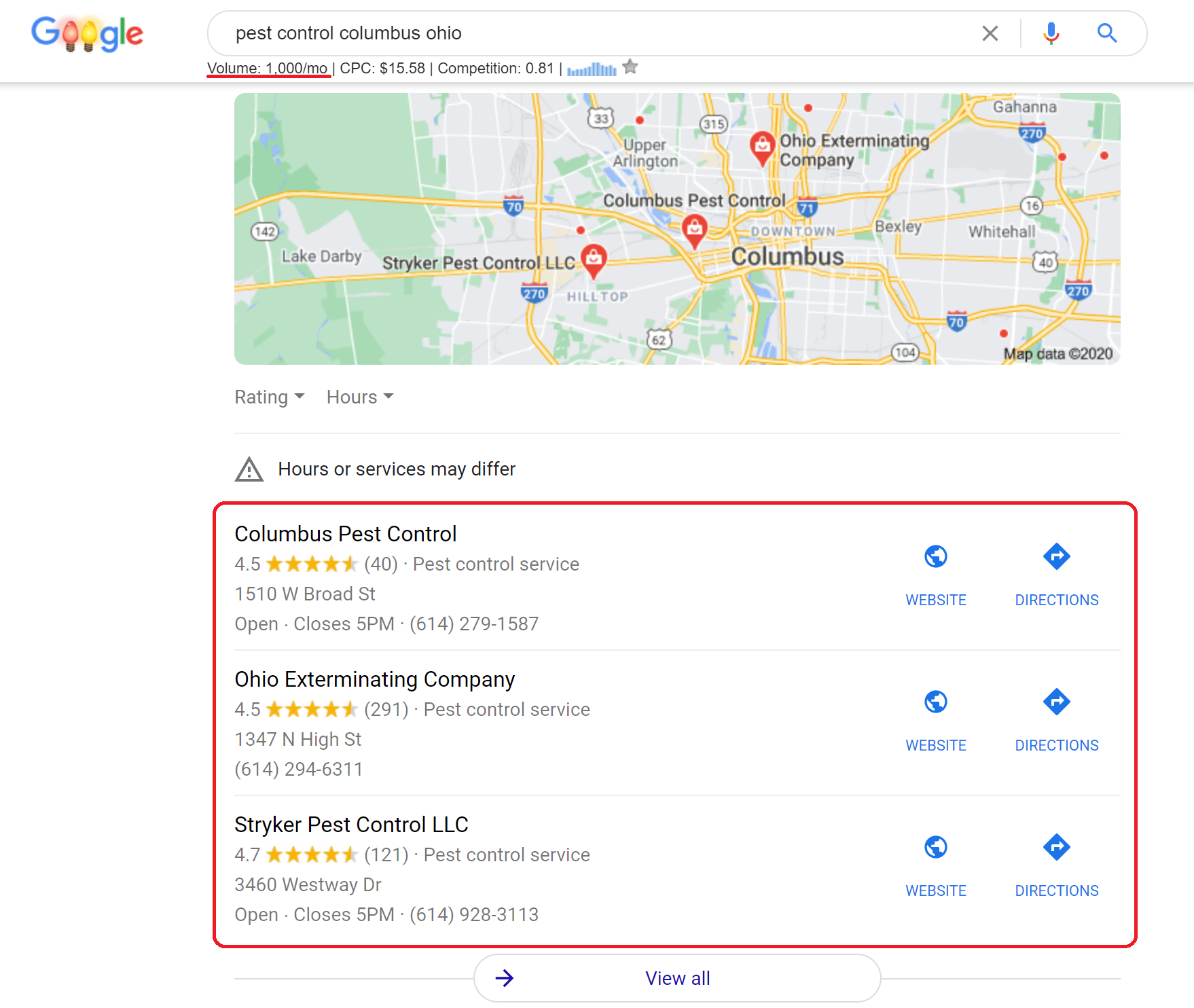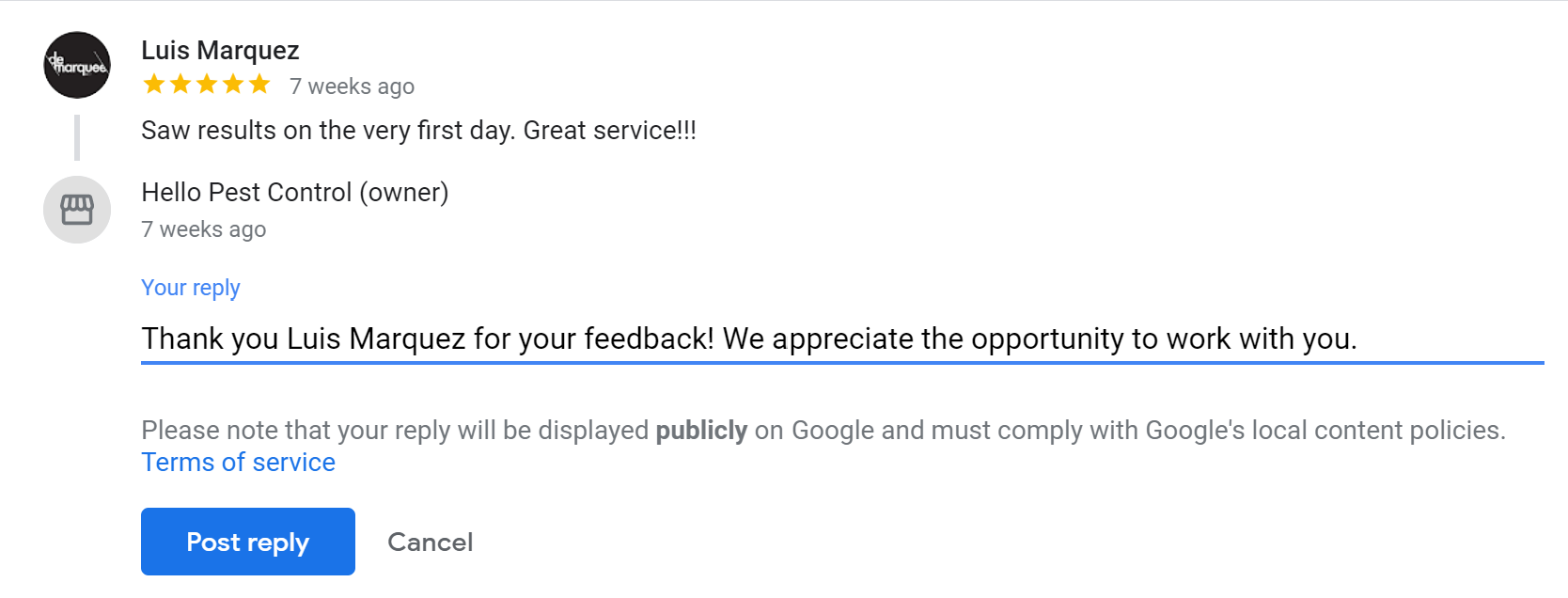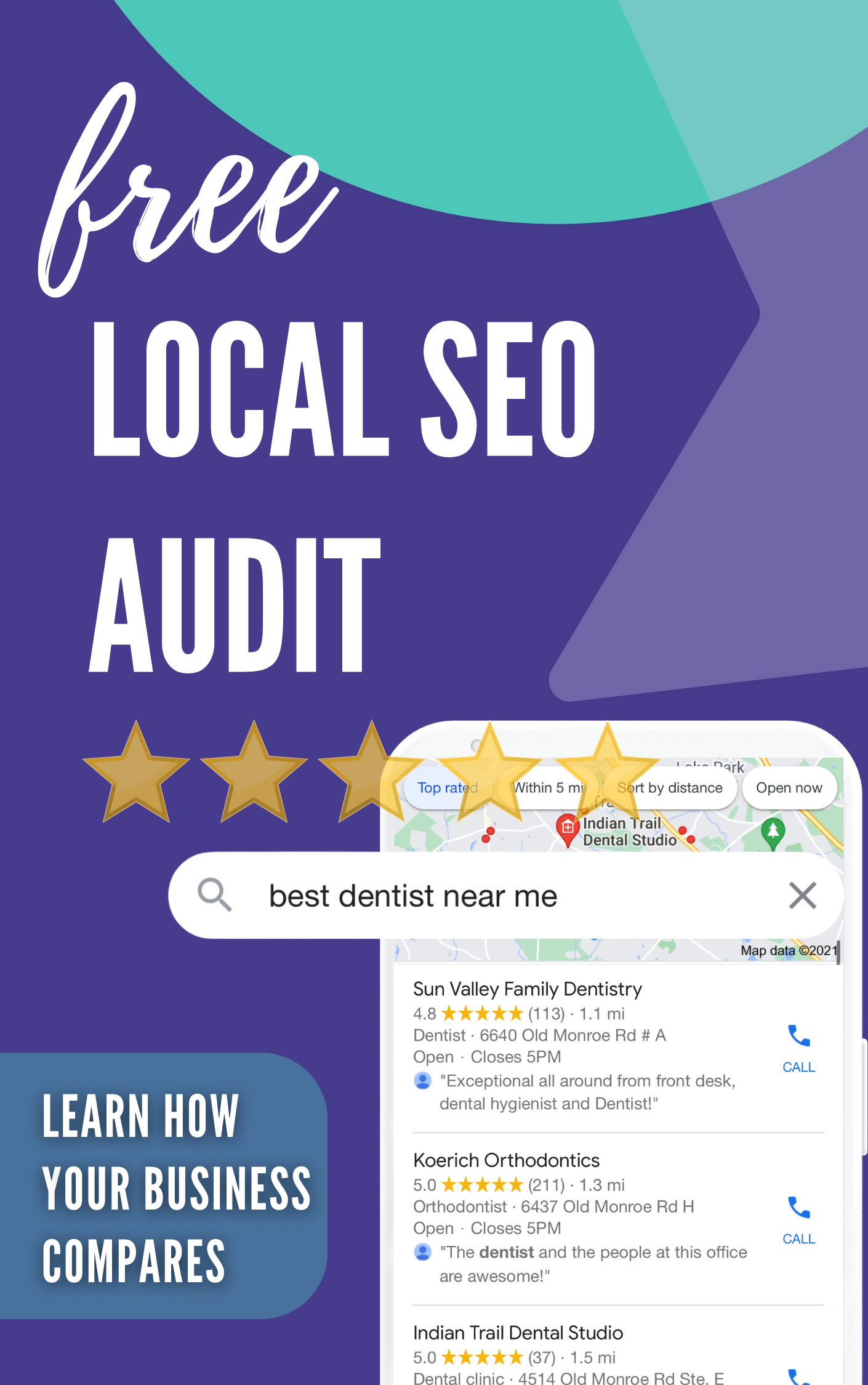Local Google reviews can absolutely influence SEO. Customer reviews, both positive and negative, are factored into the complex algorithm Google uses to determine how it ranks local businesses. This is no surprise, as Google wants to show the best companies to their searchers, and reviews are a reasonable differentiator.
Studies have proven the effect reviews have on SEO, and Google has tacitly admitted the connection. We’ll drill down into exactly how Google reviews can help with SEO in several different ways.
The Basics of Google Local Ranking
A lot of things play into how Google ranks local businesses for different search queries. Things like business categories, keywords, incoming links, on-page SEO and more are all taken into account when Google displays a list of businesses to choose from.
Review Signals are the 3rd most influential component to get higher rankings in the local pack according to Moz, with a 15.44% share of all ranking factors. Moz lists the top 8 local pack ranking factors accordingly:
- Google My Business Signals (Proximity, categories, keyword in business title, etc.) 25.12%
- Link Signals (Inbound anchor text, linking domain authority, linking domain quantity, etc.) 16.53%
- Review Signals (Review quantity, review velocity, review diversity, etc.) 15.44%
- On-Page Signals (Presence of NAP, keywords in titles, domain authority, etc.) 13.82%
- Citation Signals (IYP/aggregator NAP consistency, citation volume, etc.) 10.82%
- Behavioral Signals (Click-through rate, mobile clicks to call, check-ins, etc.) 9.56%
- Personalization 5.88%
- Social Signals (Google engagement, Facebook engagement, Twitter engagement, etc.) 2.82%
Just to be clear, the local pack is in reference to here:

This is quickly becoming the go-to spot for consumers to find a local business. People like to do their research here primarily because of the quick-glance of the business’s star rating and then being able to dig deeper to read real customer reviews.
Local Pack Vs. Organic Rankings & Reviews
Considering reviews are a piece of the local listing, they influence ranks in the local rank more than organic rankings. However, that’s not to say that they don’t benefit your organic rankings as well. Compared to being the 3rd most influential piece of local rankings, review signals are 7th for organic ranking factors according to Moz at 6.47%.
Although it’s lower on the totem pole for organic rankings, it’s still not something to ignore. If your local business is only concerned with organic rankings instead of Local Pack rankings, it may be time to shift your attention.
Review Quantity
Review quantity simply refers to the number of reviews your Google Business Page has. To no surprise, if 2 businesses have a 4.9 star rating, but one has 30 reviews and the other has 200 reviews, the consumer is likely going to choose the one with 200 reviews.
Because of this psychology of the business prooving it’s worth, Google respectfully ranks them a little higher.
Don’t forget, Google is a service. It wants to show us what we most want to see. Part of that is connecting us to the best business for our needs.
Having the most reviews (with a positive overall rating) in your industry is an easy way to position yourself as the most attractive choice.
Google Reviews with Text
As the reviewer, you are given the option to give a star rating as well as a description of your experience, or you can simply give a star rating with no explanation. To no surprise, Google prefers and gives credit to reviews with text over reviews with no text.
And so does the consumer.
When a consumer goes to your page and sees a bunch of reviews but no explanations, their needs won’t be met for your business. Consumers want to get down into the dirt of your customer’s opinions so they can make a real depiction of your business and what to expect if they choose you.
Review Velocity
Review velocity refers to the flow of consistent reviews coming into your business. If you’re actively getting reviews on your business page, it shows Google that you’re taking it seriously and likely a legitimate business to recommend it’s users too.
Aside from Google’s opinion, review velocity plays a big role in attracting a consumer as well. BrightLocal conducted a study where they found that 73% of people find reviews over 3 months old no longer a useful representation of the business. So no, those 30 reviews you acquired in 2017 won’t cut it.
Businesses can change over the course of a couple of months. Ideally, people want to see what someone who used your business yesterday has to say about their experience.
To have fresh reviews coming in consistently will not only benefit your local rankings, it will also attract more customers.
Review Diversity
If you haven’t heard of NAP and Citations before, read this post. In summary, it means having your business listed in as many directories as possible, and assuring that your business’s information is consistent across the web (NAP stands for Name, Address & Phone Number.)
Since Google pays much attention to this as a ranking factor (even more than review signals) it makes sense that they analyze your reviews on these sites too.
The number of reviews you have on these sites, as well as the speed you get them, plays into this piece of the puzzle as well – although they’re not as important as Google reviews.
Authority of Third-Party Review Sites
The authority of the other sites you generate reviews on also plays a role in review diversity and local rankings. The higher the authority of the site you’re getting reviews on, the better it will look for your business.
Here are some of a few directory sites with a high Domain Authority:
- BBB.org – 95 DA
- TripAdvisor – 95 DA
- Mapquest – 94 DA
- Angie’s List – 89
- Zomato – 86
- Home Advisor – 84
Keywords in Reviews and SEO
Moz ranks product/service keywords in reviews 12th in their Top 50 Local Pack Finder Factors.
If you’re a pest control operator, and your 5-star reviews talk a lot about “bed bugs” this should benefit your rankings for bed bug related searches in your area.
Google actually recently introduced the “Ask A Question” feature, where a searcher can type something they have a question about, and Google finds reviews that answer the question, highlighting similar keywords.
Keywords in reviews are going to be more and more important so that people can find the answers they want. Although you can’t tell a person to mention your keywords in their review, the more reviews you get the more chance people will start mentioning what you want them too.
To understand how this works, imagine if someone were to search for “hamburgers and pizza.” In the local pack portion of Google’s search rankings, where local businesses show up under a map of the area, Google looks for the keywords “hamburgers” and “pizza” in both the text of local restaurants’ websites as well as the text of the local reviews they’ve received under their Google My Business account.
For example, imagine if restaurant A has one review, which says:
“I love this place. Their hamburgers are the best around!”
While restaurant B has these three reviews:
“Really good food. They make a mean cheesesteak. Worth the try!”
“I keep coming back. Try a slice of their Margherita pizza. It’s fantastic!”
“Really great, classic hamburgers and french fries. Steak cut fries rule!”
Both restaurants will get a boost when people search for hamburgers. But because restaurant B has more reviews, it has more possible search term matches. It could also get a boost when people search for cheesesteaks, pizza, and french fries.
Engagement Signals and SEO
How much people engage with your Google Business listing plays a factor in your rankings. This includes looking at pictures, requesting directions, visiting your website, asking questions, and, you guessed it, reading reviews.
The amount of time a searcher spends looking at your listing is an indicator to Google. If you have hundreds of reviews to filter through, this will increase the time spent on your page and increase your overall rankings.
Having A Positive Sentiment in Reviews
This one is pretty self-explanatory. It may be scary to think that Google can pick up the tone of your review, but it very well can. If your reviewers are raving about your service and employees, using words like “best”, “great”, and “very happy”, Google will have to believe that you’re doing a pretty good job.
If Google believes you’re doing a good job based on the word of your past customers, they’ll reward you with higher ranks in the local pack.
Authority of the Reviewer
We’ve all heard of the term “Yelpers”. This practice of giving a status to the customers leaving reviews has spread to other review sites as well. Even Google has its “Local Guides” and sites like TripAdvisor and Foursquare give out badges to their contributors.
When you get a review from a Google Local Guide who has reviewed 100 other businesses, it is weighted more than a Google review from someone who just left their first review.
After you’ve done a bunch of Google reviews, (or reviews on another site) you’ve gained the trust of Google. In return, your opinion will be more valuable to them than and likely show at the top of your reviews as a “most relevant” review.
The more reviews you get for the rock-star contributors, on both Google and third-party review sites, the better rankings you should see.
Don’t go crazy over this, however, since it is only #48 on Moz’s Top 50 Local Pack Finder Factors. You also can’t pick and choose to do business with these elite reviewers.
Now that we’ve gone over all the little details for how reviews can improve your SEO, let’s talk negatives.
Negative Factors for Reviews and SEO
Without getting too into it, let’s briefly discuss how you can mess up your rankings due to poor review practices.
Negative Sentiment
Just as a positive sentiment helps your ranking, if your reviewers are consistently using negative language to describe your business, this will hurt your positioning.
Low Ratings
If you have a poor overall rating from reviews, Google will assume your business is not that great and won’t want to send business your way. Therefore, you will see lower rankings.
This also pertains to having a low-quality score on other third-party review sites.
Reported Fake Reviews
There’s nothing Google hates more than phonies. If you’re trying to play their system by putting fake reviews on your profile page and get caught, you’ll be in trouble.
Sometimes getting caught with fake reviews can even lead to the complete suspension of your business page from Google.
In which case, were the fake reviews really worth it?
Reports of Review Gating
Some companies try this practice called “Review Gating” to keep negative buzz out of the public eye. Basically, they ask the customer if the service was good or before sending them to the review page.
If they give the thumbs up, they are sent to leave a public review on Google. If they give a thumbs down, they are sent to a private form so that the company can handle the situation without having their reputation hurt online.
Being caught doing something like this can result in all your reviews being deleted, or even page suspension. Google wants an authentic representation of your business from your reviews. If you’re going to manipulate that, they’re going to take action against you.
Too Many Reviews At Once
A common thing businesses do when they get a review generation tool like 2 Step Reviews is taking their lifetime database of customers and sending them all a review invitation at one time.
Not only are the results from mass messaging review requests terrible, but they also are a bad look in the eyes of Google.
If you haven’t had any reviews in the past 5 months, and now all of a sudden you get 100 in 5 days, this is going to raise a red flag.
Be smart when asking for reviews and only ask after you’ve just finished service with a customer.
Responding to your reviews helps improve SEO too.
Indeed it does. In fact, we recommend to all of our users to respond to all reviews no matter what they may say.

This is good advice in general, since responding to reviews shows your positive reviewers that you appreciate their kind words, and it shows your negative reviewers that you care enough about them to try and resolve their issues.
It’s also a good SEO strategy. For one, Google encourages people to respond to their reviews and rewards businesses that do. But also, like the review itself, the text of your response is included in the total word pool for search term matches. This means you can craft your responses to include useful keywords for SEO.
Of course, you have to be very careful about this. If your responses read like you’re trying to pander to the search engine, you’ll come off as disingenuous to your customers and risk alienating them. Keep your responses heartfelt and genuine, and slip in a search term or two if it flows.
Are Reviews Going Away Any Time Soon?
We don’t think so.
There hasn’t been a better way to get an accurate representation of businesses besides customer reviews and other user-generated content.
Any business can talk about how it’s the best in town, but in today’s day and age, it’s the customer’s voice that matters.
My personal opinion is that review velocity is going to become a bigger factor in all this. Being able to consistently get fresh reviews – no matter positive or negative – is a good sign that you are still in business. Being that Google has come out saying there are millions of fake business listing on Google, review consistency will be a great way to separate the real from the fake.
2 Step Reviews can help.
Our easy-to-use app automates the process of asking for a review. Just enter your customer’s name, and contact info and the app will reach out for you. We know how to request reviews, and our specific language greatly increases the chances of getting one.
Once reviews start coming in, you’ll be easily able to respond to the reviews straight from our dashboard. Just click respond, type your response, and submit.
Getting reviews has never been easier, and more important.


